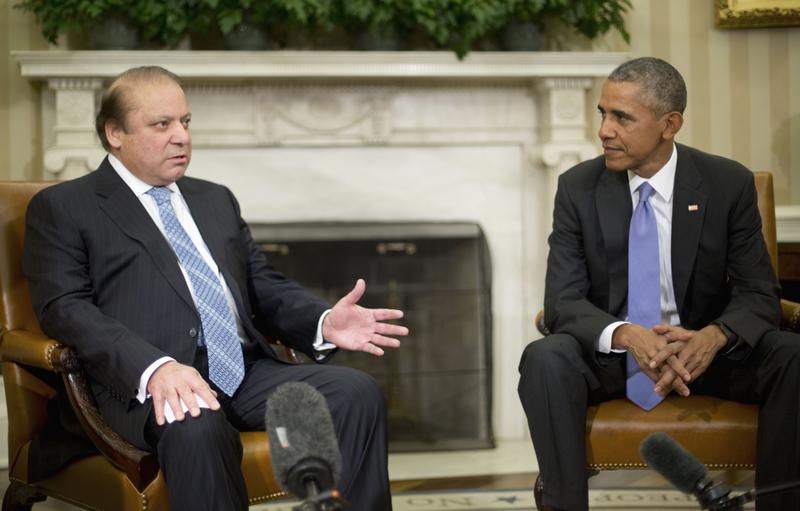By Xenia Wickett
In advance of a visit by Pakistani President Nawaz Sharif last week, the Obama administration announced that it was planning to sell an additional eight F16 fighter jets to Pakistan. While Obama is right to want to build a new relationship with Pakistan, it is going about this in the wrong way; once again, thinking short term while hoping to achieve long-term goals. The United States made this mistake before, when I served in the White House covering Pakistan in the mid-2000s. It needs to learn from those mistakes.
Following the events of September 11, 2001, President Bush announced that you were either ‘with us or against us.’ Then-Pakistani President Pervez Musharraf chose the former. In subsequent years, the United States took a number of actions, including giving Pakistan Major Non-NATO Ally (MNNA) status and following through on providing Pakistan with 24 F16s that had been sold 15 years earlier but, due to Pakistan’s burgeoning nuclear weapons programme, had never been delivered.
The United States took these steps in the context of trying to build what it considered a strategic relationship with Pakistan. Ironically, the activities undertaken during this period instead epitomized a transactional relationship. The U.S. government believed that they and Pakistan had many common interests, not least in the area of countering Islamic extremism in the region and in helping to build a developing, open, and non-corrupt society.
The United States did not see, perhaps in part because it did not want to, that it actually had, at best, overlapping or tangential interests. With a number of factions in Pakistan, in particular the military and Inter-Services Intelligence, it had quite different interests.
The result of more than $20 billion of military support to Pakistan over 14 years was, if anything, a less trusting relationship. The United States has achieved few, if any, of its goals. Pakistan and India are still at loggerheads. Afghanistan is still fighting the Taliban, many of whom rest up between operations on the Pakistan side of the Durand line that separates the two nations. Terrorists continue to train inside Pakistan for operations in India, Afghanistan, or Pakistan itself. Pakistan’s nuclear arsenal continues to grow, and concerns are rising over increasing Islamic fervour within the military. Pakistan’s economy still lags behind regional rivals, the media remains heavily restricted, and education is barely improved. The military still rule the roost; as has been noted before, Pakistan is a military with a country, rather than a country with a military.
It is in this context that Nawaz Sharif visited Washington and the U.S. administration sent to Congress a request to approve the sale of eight new F16s — jets that are far more capable of fighting India than they are of fighting any terrorist group (although they have been used in recent years for the latter). Rumours abound that the United States might also be considering a deal in which it might support a waiver for Pakistan in the Nuclear Suppliers Group (giving it access to civilian nuclear materials) in return for restrictions to its nuclear weapons and their delivery systems.
The U.S. government needs to urgently rethink its strategy. While it is a laudable goal to limit Pakistan’s nuclear weapons capabilities, it is not going to happen given the domination of the military. Furthermore, if the U.S. Congress rejects the arms sale, as seems likely, it will, if anything, reinforce the Pakistani sense of America’s untrustworthiness.
But more profoundly, Washington is once again pursing policy under the misapprehension that its policy is also in the interests of — and a priority for — Pakistan and its military. Once again a short-term transactional deal is being attempted in the hopes of bridging a long-term strategic interest gap. And in driving forward its own agenda, the United States is again disempowering precisely those Pakistanis that it should be empowering — the people. Washington will again find itself with an emptier wallet, but no better off.
Washington would do far better to reverse this process. First, it should recognize that as long as the Pakistani military is on top, Islamabad’s priority will continue to be what they see as an existential threat from India. As such, non-conventional instruments — nukes and militants — are its best weapons as it can’t compete conventionally. Eight F16s will not counter that.
The United States needs to turn to the Pakistani government (perhaps even directly to the individual ministries) and get from them a list of what they need most to directly improve the lot of the Pakistan people. This will likely involve energy, infrastructure, and education to start. This list should then provide the starting point for U.S. engagement with Pakistan. China has begun to invest in this space already — the United States is lagging sorely behind in soft power terms.
By supporting the administration, the ministries, and so the people, and by ensuring that this support is driven not by the United States but by Pakistan, America has a chance of changing this bilateral relationship. The sooner it does this, the better. Otherwise, we will all be back here a decade from now, but probably worse off.
This is the first installment of a regular column by Chatham House experts on U.S. foreign policy. Xenia Wickett is the project director of the US Project at Chatham House.
—————————————————
Arnold Zeitlin, Managing Director
Editorial Research & Reporting Associates (ERRA)
13828 Coleman Court, Centreville, Virginia 20120, U.S.A.
Telephone: 1 703 802 0888
azeitlin@hotmail.com
http://azeitlin.wordpress.com/










